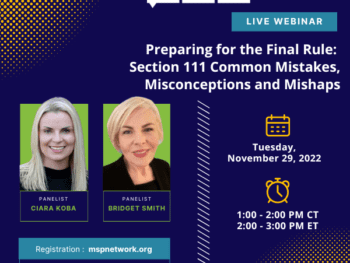
Understanding the Re-Review Process
If CMS responds to the submission of a WCMSA with a counter-higher (that is, it increases the proposed MSA amount), you can request a re-review in the following instances:
- You believe CMS’ determination contains obvious mistakes (e.g., a mathematical error or failure to recognize medical records already submitted showing a surgery, priced by CMS, that has already occurred); or
- You believe you have additional evidence, not previously considered by CMS, which was dated prior to the submission date of the original proposal and which warrants a change in CMS’ determination (emphasis added).
Knowing how to effectively use the re-review process is key and should include using a trusted MSP service partner to drive settlements when CMS disagrees with the original allocation.
Case Study (Provided by Tower MSA Partners): 60% MSA Savings From CMS Re-Review Process
CMS may increase prescription medication allocation in a WCMSA if there are inconsistencies in the medical records or the prescription histories, variances in pricing based upon the fluid movement of Redbook medication pricing, or prescription medications are left open-ended in the medical treatment records. This case study considers the challenge and solution to a re-review presenting both inconsistencies in medical records as well as open-ended prescription medications.
Challenge
CMS countered higher to include Gabapentin 600 mg tablets (AWP-$2.28/per pill), increasing the CMS approved MSA amount to $98,054. The physician had increased prescribed strength from 300mg to 600mg. However, the injured worker had not filled 600mg prescription. The prescription drug history showed consistent fills of Gabapentin 300 mg capsule (AWP -.03/per pill).
Solution
Tower MSA prepared a letter for submission to the treating physician confirming continued fills of Gabapentin 300 mg capsules. As required in Montana, notice was given to the injured worker and his counsel prior to initiating contact with the physician. The letter was submitted to the physician’s office via fax and was placed on physician’s letterhead and executed by the physician with language as follows:
“The above captioned patient is under my care for treatment of chronic back pain and neuropathic pain. He will be prescribed Gabapentin 300 mg capsules taking 2 capsules three (3) times / day to help him manage his pain”.
The executed physician letter, which emphasized the consistent history of Gabapentin 300mg refills, was submitted to CMS for Re-Review.
Result
CMS accepted Tower’s physician letter and reduced its CMS approved MSA amount from $98,054 to $33,319, resulting in a savings of $64,735.
While CMS stipulates in its guidelines that documentation obtained post CMS submission will not be accepted, the use of the rationale that the injured worker had not filled the 600 mg strength was effective to obtain a positive CMS Re-Review outcome.
Conclusions
The WCMSA review process is unavoidable when the settling parties require the assurance of CMS’s stamp of approval Claims management teams and other interested stakeholders can save their programs time and money by fully understanding and properly planning and coordinating both the MSA submission and re-review of a counter-higher if necessary. An experienced MSP service provider is recommended as the planning, coordination, and execution will be included at no additional charge in a best-in-class program.

Contact: mstack@reduceyourworkerscomp.com.
Workers’ Comp Roundup Blog: https://blog.reduceyourworkerscomp.com/
©2017 Amaxx LLC. All rights reserved under International Copyright Law.
Do not use this information without independent verification. All state laws vary. You should consult with your insurance broker, attorney, or qualified professional.
























